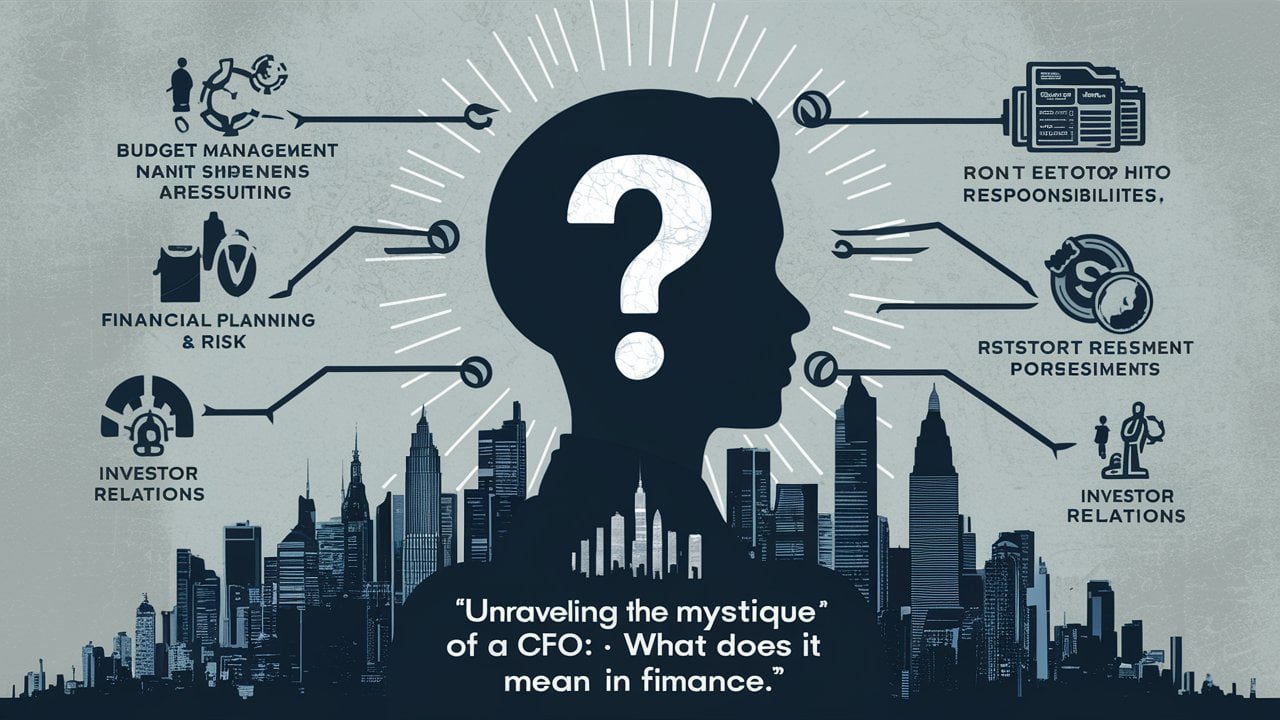In the intricate world of finance, there stands a figure shrouded in mystique and power — the Chief Financial Officer (CFO). Often regarded as the financial architect of an organization, the CFO plays a pivotal role in steering the financial trajectory of companies.
But what exactly lies beneath this enigmatic title? What does it mean for the intricate dance between cents and sensibility within businesses? Unraveling the Mystique of CFO delves deep into these questions, shedding light on the intricacies that define one of the most critical positions in corporate landscapes.
Beyond merely crunching numbers, the CFO embodies a strategic visionary who wields financial acumen to navigate complex terrains with finesse. They are not just custodians of fiscal health but also architects of sustainable growth and operational efficiency.
As undeniable stewards of financial stability, their decisions reverberate not only through profit margins but also influence broader company strategies.
In essence, to understand the CFO is to grasp a fundamental pillar that upholds the economic fortitude of an organization — where numbers merge seamlessly with aspirations to drive success in dynamic markets. Explore with us as we decode this venerated yet enigmatic persona that shapes destinies within boardrooms and balance sheets alike.
Understanding the CFO Role.
The Chief Financial Officer (CFO) plays a pivotal role in a company, serving as the guardian of financial health and future viability. While overseeing financial planning and analysis is a core responsibility, a CFO’s duties extend far beyond number crunching.
They are key strategic partners to the CEO and board, providing insights that shape crucial decisions. For instance, when Nick Akerman took on the CFO role at a growing tech startup, his expertise in financial planning not only optimized cash flow management but also informed the decision to expand operations into international markets.
In addition to their involvement in day-to-day financial matters, CFOs actively contribute to shaping overall company strategy. Whether it’s evaluating potential mergers and acquisitions or restructuring existing processes for better efficiency, CFOs bring a financial lens to strategic discussions.
An illustration of this can be seen with Sarah Chen, who as CFO of a global retail chain saw an opportunity for growth through digital transformation. By aligning finance strategies with technological advancements, she helped drive the company towards enhanced customer engagement and increased profitability.
The importance of a CFO’s financial acumen cannot be overstated; their expertise guides the organization through complex financial landscapes while mitigating risks. This proficiency not only safeguards the company’s assets but also enables sustainable growth.
When Henry Wu joined an established manufacturing firm as CFO, his deep understanding of industry-specific challenges steered the company successfully through economic downturns by implementing cost-saving measures without compromising quality standards.
Such examples underscore how a CFO’s financial expertise is instrumental in consistently steering companies towards success amidst dynamic market conditions.
Qualifications and Skills Required for a CFO.
To ascend to the prestigious role of Chief Financial Officer (CFO), individuals must possess a diverse set of qualifications and skills. While educational backgrounds can vary, most CFOs hold advanced degrees, with MBAs and CPAs being common accreditations.
These credentials provide the necessary foundation in accounting, finance, economics, and business management that is crucial for managing the financial health of an organization. Additionally, many top CFOs continue their professional development through certifications like the Chartered Financial Analyst (CFA), enhancing their expertise in investment management and financial analysis.
Beyond academic achievements, successful CFOs exhibit a unique blend of skills essential for navigating the complex world of finance. Strategic thinking stands out as a key attribute since CFOs are not just number crunchers but strategic partners who help shape organizational direction.
Leadership is another critical skill, enabling CFOs to drive change and foster collaboration across departments. Financial acumen is perhaps the cornerstone skill, allowing CFOs to interpret financial data accurately and make informed decisions that impact the company’s bottom line.
Moreover, experience plays a vital role in determining an individual’s readiness for assuming the responsibilities of a CFO. Companies often seek candidates with a proven track record in progressively senior financial roles such as Controller or Vice President of Finance before considering them for CFO positions.
This experience equips future CFOs with the practical knowledge needed to tackle challenges effectively and guide strategic financial planning. In today’s competitive landscape, businesses are looking for well-rounded leaders who can not only manage finances but also drive innovation and sustainable growth – qualities that define exceptional Chief Financial Officers poised to lead their companies toward success.
Challenges Faced by CFOs Today.
In today’s fast-paced financial landscape, Chief Financial Officers (CFOs) encounter a myriad of challenges that test their expertise and decision-making skills. Firstly, navigating economic uncertainties and market volatility stands as a significant obstacle for CFOs.
Whether it’s adapting to global economic downturns or managing geopolitical risks, CFOs must stay agile in their financial strategies to safeguard their companies against unpredictable market fluctuations.
Moreover, CFOs are tasked with the delicate balance of aligning short-term financial goals with long-term strategic vision. This challenge requires CFOs to not only focus on quarterly earnings but also set the financial groundwork for sustainable growth and competitive advantage over time.
Being able to thread this strategic needle is crucial for maintaining the company’s financial health while driving long-term value creation.
Another pressing issue faced by modern CFOs is the need to address technological advancements impacting finance operations. With the rise of digital transformation and automation in financial processes, CFOs are required to embrace innovative technologies like AI, blockchain, and data analytics to streamline operations, enhance decision-making capabilities, and ensure data security.
Successfully leveraging these tech tools becomes essential for CFOs aiming to lead their companies into a digitally optimized future.
Evolution of the CFO Position Over Time.
The evolution of the Chief Financial Officer (CFO) position has been a journey from monotonous number-crunching to becoming a pivotal strategic partner within organizations. Historically, CFOs were primarily responsible for financial reporting and compliance.
However, as businesses grew more complex and dynamic, the role underwent a significant transformation. Modern CFOs are now key players in driving business decisions, aligning financial strategies with overall corporate goals, and even shaping organizational culture.
One of the most notable shifts in the role of CFOs has been from focusing solely on traditional finance functions to actively engaging as strategic business partners.
Today’s CFO is not confined to spreadsheets and ledgers; they are integral in devising long-term financial plans, assessing investment opportunities, and providing insights that shape the direction of the company. This transformation signals a broader recognition of their impact on organizational success beyond mere financial management.
Moreover, with the advent of digitalization and data analytics, CFOs have adapted to embrace technology as a tool for efficiency and growth. Leveraging advanced analytics capabilities, modern CFOs can forecast trends, identify risks, and capitalize on emerging opportunities with precision.
The ability to translate data into strategic insights has become a defining characteristic of successful CFOs in today’s fast-paced business landscape. As digital advancements continue to redefine operational landscapes, CFOs must stay agile and innovative to drive performance and navigate uncertainties effectively.
CFO Success Stories: Leading the Financial Frontline.
In the realm of finance, there are several noteworthy CFO success stories that illuminate the pivotal role these individuals play within organizations. Consider the story of Ruth Porat, who made a significant impact as CFO at Morgan Stanley before moving to Alphabet Inc. in 2015.
Porat’s strategic financial planning was instrumental in turning around Morgan Stanley during the global financial crisis and later at Google’s parent company, where she led efforts to streamline expenses and boost transparency. Her ability to balance innovation with fiscal responsibility showcases the power of a visionary CFO.
Other top-performing CFOs implement strategies aimed at driving growth and profitability. Take the example of Luca Maestri, Apple’s CFO since 2014. Under his leadership, Apple experienced remarkable financial success through initiatives like expanding their services business and optimizing capital allocation for sustainable growth.
Maestri’s focus on operational efficiency and prudent investment decisions has propelled Apple to new heights in terms of revenue and market value.Furthermore, inspirational stories abound within the realm of innovative financial leadership by CFOs. Look no further than Gail Boudreaux, who served as UnitedHealth Group’s CFO before becoming CEO of Anthem Inc.
Boudreaux’s journey illustrates how a strong foundation in financial acumen combined with strategic vision can lead to remarkable career advancements within an organization. Her trajectory from CFO to CEO highlights the transformative potential when finance leaders embrace both traditional expertise and forward-thinking approaches in navigating complex business landscapes.
These successes demonstrate that top-performing CFOs not only fulfill traditional financial roles but also act as catalysts for organizational growth and adaptation.
By leveraging their expertise in financial planning, strategic decision-making, and operational efficiency, these individuals chart paths toward sustained prosperity, inspiring future generations of finance professionals to redefine what it means to be a successful CFO in today’s dynamic business environment.
Reimagining the Future Role of CFOs.
As the business landscape continues to evolve at a rapid pace, the role of Chief Financial Officers (CFOs) is also undergoing a transformation. Gone are the days when CFOs were solely focused on financial record-keeping and reporting.
Today, they are strategic partners who play a crucial role in driving growth, managing risk, and shaping the overall success of their organizations. Looking ahead, the future CFO will need to embrace technology, possess strong leadership qualities, and adapt quickly to changing market dynamics.
The changing nature of businesses demands that CFOs not only understand numbers but also possess the agility to interpret data trends, anticipate risks, and capitalize on opportunities.
By fostering innovation, harnessing digital tools for decision-making, and enhancing their strategic influence across departments, CFOs can truly redefine what it means to be at the helm of financial leadership in today’s fast-paced world.
The evolving landscape requires CFOs to blend traditional financial acumen with modern-day skills to navigate challenges effectively and drive sustainable growth for their organizations in the years to come.




